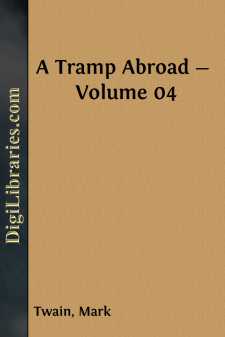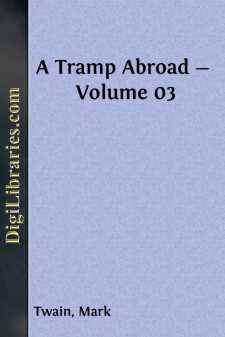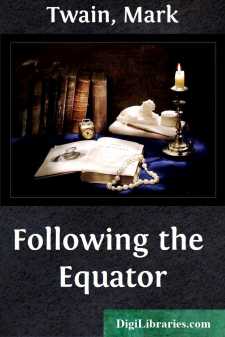Categories
- Antiques & Collectibles 13
- Architecture 36
- Art 48
- Bibles 22
- Biography & Autobiography 813
- Body, Mind & Spirit 142
- Business & Economics 28
- Children's Books 15
- Children's Fiction 12
- Computers 4
- Cooking 94
- Crafts & Hobbies 4
- Drama 346
- Education 46
- Family & Relationships 57
- Fiction 11828
- Games 19
- Gardening 17
- Health & Fitness 34
- History 1377
- House & Home 1
- Humor 147
- Juvenile Fiction 1873
- Juvenile Nonfiction 202
- Language Arts & Disciplines 88
- Law 16
- Literary Collections 686
- Literary Criticism 179
- Mathematics 13
- Medical 41
- Music 40
- Nature 179
- Non-Classifiable 1768
- Performing Arts 7
- Periodicals 1453
- Philosophy 64
- Photography 2
- Poetry 896
- Political Science 203
- Psychology 42
- Reference 154
- Religion 513
- Science 126
- Self-Help 84
- Social Science 81
- Sports & Recreation 34
- Study Aids 3
- Technology & Engineering 59
- Transportation 23
- Travel 463
- True Crime 29
The Innocents Abroad - Volume 06
by: Mark Twain
Description:
Excerpt
We descended from Mount Tabor, crossed a deep ravine, followed a hilly, rocky road to Nazareth—distant two hours. All distances in the East are measured by hours, not miles. A good horse will walk three miles an hour over nearly any kind of a road; therefore, an hour, here, always stands for three miles. This method of computation is bothersome and annoying; and until one gets thoroughly accustomed to it, it carries no intelligence to his mind until he has stopped and translated the pagan hours into Christian miles, just as people do with the spoken words of a foreign language they are acquainted with, but not familiarly enough to catch the meaning in a moment. Distances traveled by human feet are also estimated by hours and minutes, though I do not know what the base of the calculation is. In Constantinople you ask, "How far is it to the Consulate?" and they answer, "About ten minutes." "How far is it to the Lloyds' Agency?" "Quarter of an hour." "How far is it to the lower bridge?" "Four minutes." I can not be positive about it, but I think that there, when a man orders a pair of pantaloons, he says he wants them a quarter of a minute in the legs and nine seconds around the waist.
Two hours from Tabor to Nazareth—and as it was an uncommonly narrow, crooked trail, we necessarily met all the camel trains and jackass caravans between Jericho and Jacksonville in that particular place and nowhere else. The donkeys do not matter so much, because they are so small that you can jump your horse over them if he is an animal of spirit, but a camel is not jumpable. A camel is as tall as any ordinary dwelling-house in Syria—which is to say a camel is from one to two, and sometimes nearly three feet taller than a good-sized man. In this part of the country his load is oftenest in the shape of colossal sacks—one on each side. He and his cargo take up as much room as a carriage. Think of meeting this style of obstruction in a narrow trail. The camel would not turn out for a king. He stalks serenely along, bringing his cushioned stilts forward with the long, regular swing of a pendulum, and whatever is in the way must get out of the way peaceably, or be wiped out forcibly by the bulky sacks. It was a tiresome ride to us, and perfectly exhausting to the horses. We were compelled to jump over upwards of eighteen hundred donkeys, and only one person in the party was unseated less than sixty times by the camels. This seems like a powerful statement, but the poet has said, "Things are not what they seem." I can not think of any thing, now, more certain to make one shudder, than to have a soft-footed camel sneak up behind him and touch him on the ear with its cold, flabby under-lip. A camel did this for one of the boys, who was drooping over his saddle in a brown study. He glanced up and saw the majestic apparition hovering above him, and made frantic efforts to get out of the way, but the camel reached out and bit him on the shoulder before he accomplished it. This was the only pleasant incident of the journey.
At Nazareth we camped in an olive grove near the Virgin Mary's fountain, and that wonderful Arab "guard" came to collect some bucksheesh for his "services" in following us from Tiberias and warding off invisible dangers with the terrors of his armament. The dragoman had paid his master, but that counted as nothing—if you hire a man to sneeze for you, here, and another man chooses to help him, you have got to pay both. They do nothing whatever without pay. How it must have surprised these people to hear the way of salvation offered to them "without money and without price." If the manners, the people or the customs of this country have changed since the Saviour's time, the figures and metaphors of the Bible are not the evidences to prove it by.
We entered the great Latin Convent which is built over the traditional dwelling-place of the Holy Family. We went down a flight of fifteen steps below the ground level, and stood in a small chapel tricked out with tapestry hangings, silver lamps, and oil paintings. A spot marked by a cross, in the marble floor, under the altar, was exhibited as the place made forever holy by the feet of the Virgin when she stood up to receive the message of the angel....












